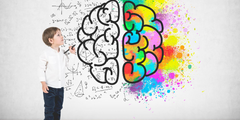During brain development presentations and workshops that I provide, participants frequently ask if “educational Apps” or programs to teach babies to read or learn academic skills are a good idea for early brain development. I recently had a grandmother ask if these are good gifts to give. I really appreciate these questions because this affords the opportunity to continue to create the awareness that these are NOT the way children learn best. It also provides the chance to share how much more advantageous book reading and nurturing interactions are to healthy brain connections and optimal learning.

It is difficult for many caring and well-intentioned parents and grandparents because so many Apps, electronic toys and DVD programs are marketed to say they are good for early development. The reality is they are just the opposite of what growing brains need!
The National Scientific Council on the Developing Child reports:
“Although a varied array of experiences clearly stimulates learning in the preschool years, promotional statements about the superior brain building impacts of expensive “educational” toys and videos for infants and toddlers have no scientific support.”
Sharing books and interacting directly with children however has been proven to benefit learning and early brain development in NUMEROUS ways.
In the article, ‘Nothing short of remarkable’: Study finds parents’ chats with their toddlers pay off 10 years later, the positive impact of direct conversations is conveyed.
The article shares: “a study published in Pediatrics that found that toddlers with parents who spend lots of time listening and chatting with them are more likely to have better language skills and higher IQs a decade later than youngsters left hanging in silence.”
Brain Insights on reading and talking vs. screen time:
- When a child is read to, cells in the brain are triggered within seconds. Some existing connections in the brain are strengthened while new connections are formed. This helps create a more defined and complex wiring in the brain. Repeated book reading experiences strengthen connections, which will benefit a child for life. And children naturally want their favorites read again and again.
- Reading to a child is so important that the American Academy of Pediatrics now recommends that pediatricians prescribe reading activities to parents during their well child visits. The AAP also recommends no screen time for the first 18 months of a child’s life and very limited screen time of only 1 hour/day for ages 2 -5 years.
- When reading a book, the child has the needed opportunity to hear direct language. The brain makes connections for language development only through experiences of being spoken to directly. A child learns the give and take of communication through these conversations. (Even in infancy.) Television, Apps and DVD’s do not provide the give and take of interactive language.
- A National Wildlife Federation report states, ““By the time most children attend kindergarten, they have watched more than 5,000 hours of television–enough time to earn a college degree.”
- Studies have shown that children who are read to at home have a higher success rate in school. The National Commission on Reading found that reading aloud to a child is the single most important intervention for developing literacy skills.
Literacy skills development isn’t the only brain benefit that results from reading to a child.
- The time spent cuddling while reading is also very important. This closeness helps the brain make valuable connections contributing to healthy emotional development. Young babies also find the sound of the voice reassuring and calming, which releases “feel good chemicals”.
- Reading with children also presents the possibility for children to open up about feelings or things that are bothering them in a comfortable way.
- Books additionally provide a way for adults to begin discussions to help children gain new perspectives and learn about people, places and things outside of their immediate environment.
The tag line I often use for Neuro-Nurturing is, "Inspiring REAL brain development for ALL young children." Several of the points above are the reason I stress the word "REAL". Through sharing information based on scientific research, we can ensure that children benefit from these types of essential and positive interactions.
For information and REAL brain development activities that are not limited to, but definitely include language and literacy development ideas to use even (and especially) during your everyday life go to www.braininsightsonline.com or download a FREE Neuro-Nurturing Guide filled with wonderful information and free samples of our wonderful line of Neuro-Nurturing Interaction Packets.




Be the first to comment